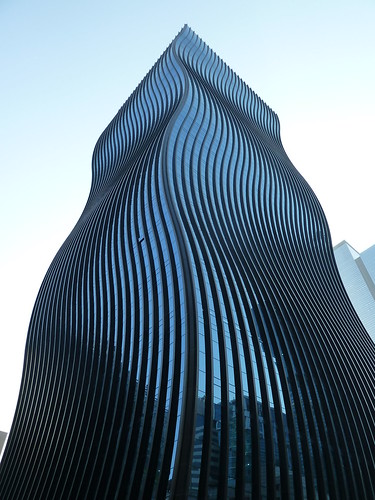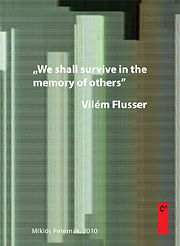What follows is a short introduction to the
McLuminations series of video discussions officially inaugurated last weekend at the
Retouching McLuhan Centennial Weekend event at the Canadian Embassy in Berlin. Future McLuminations are planned for October in Berlin and at the Frankfurt Book Fair.
 photo Dmytri Kleiner
photo Dmytri Kleiner
"At another level we have seen in this century the changeover from the debunking of traditional myths and legends to their reverent study. As we begin to react in depth to the social life and problems of our global village, we become reactionaries. Involvement that goes with our instant technologies transforms the most "socially conscious" people into conservatives.
When Sputnik had first gone into orbit a schoolteacher asked her second-graders to write some verse of the subject. One child wrote:
The stars are so big, The earth is so small, Stay as you are.
" M. McLuhan Understanding Media, Reversal of an Overheated Medium, Signet, New York, 1964 p. 49
Marshall McLuhan famously conjectured that the era of instantaneous electronic communication was going to bring about an experience of the world he termed a Global Village. Many interpreted this optimistically, as though, through the sense of universal togetherness engendered by electronic media, people around the world would shed their chauvinist antipathies, and engage together as equals. This condition of egalitarian global exchange, is, to some extent, observable today , however it is unlikely that this is much due to the prevalence of electronic media, rather, it can be seen as only a contemporary manifestation or mutation of an internationalist tendency among educated elites which has prevailed since time immemorial, which has always appropriated the latest technology. On the other hand, McLuhan's Global Village has also a dark, cautionary connotation. Rather than being a place of joyous togetherness, the Global Village may be a nightmare of intrusiveness and irrational violence.
McLuhan's work articulates a pivotal development in the consciousness of humanity, that of alphabetic literacy, which began with the Greeks, and exploded with the Gutenberg press. McLuhan often divides history, and peoples into the categories pre-literate and literate and extrapolates a period of post-literacy emerging with electronic communication.
McLuhan and Vilém Flusser coincide in their understanding that literacy generates in the literate causality, which bursts literate people out of a tribal, circular sense of time, into a linear historical sense of time. ”There is the stream of events, as it is perceived by historical consciousness. Everything flows, nothing ever repeats itself, every opportunity lost is lost forever, and everybody is within that stream of events. ” Once linearity is accellerated sufficiently by industrial technology (functioning themselves based on causal rules) what McLuhan calls the era of the tribal drum is inaugurated again with satellites and television. Flusser refers to this as a recurring mythical period where we are dominated by the power of images (inaugurated with the photograph) .
McLuhan's Global Village is a retrieval of tribal structures of society, where the increased satisfaction of an intimate horizon of meaning (all phenomena have meaning within tribal consciousness) occurs under the absolute tyranny of taboo and orthodoxy, where dissent is sanctioned through social exclusion (e.g. Excommunication, exile) which, thereby deprives a dissenter of any access to the only community in which he or she has any meaning. Excommunicated into the netherworld between communities, the Global Village Exile is practically what Georgio Agamben refers to as a homo sacer, a person without any rights, who may be killed by anyone without fear of punishment.
McLuhan died at the dawn of the internet age, so he did not experience the Massively Multi-Channel communication possible today. His vision of an all-inclusive pervasive sphere of electronic information enrobing the earth was largely that of a hegemonic effect. The public was imagined in the position of receptors and interpreters of the light-speed stimula. His praise for the experiential modes unearthed in the electronic communication was then always qualified with a cautionary barb. One example of how McLuhan bemoaned its alleged anti-intellectual , anti-literate effects is in his many critiques of how jokes had changed from more narrative jokes to the then current one-liners (which today have become even one-worders, e.g. 'meh') McLuhan exhorted the audience of his day to understand how the media worked and find a way to 'turn it off', or at least slow it down long enough that we may establish some agency within the onslaught.
But the internet, for all its whirring back and forth, is still what McLuhan would have considered a cool, low-resolution medium, therefore one which requires much physical effort (instinctively, internally, unconsciously on the part of the sensorium) in order to interpret stimuli into meaningful messages. The users of the internet are physically exhausted by this and thus have no energy for sustained reflection.
*
McLuminations, the event series, emerges out of the experience of watching television, which McLuhan described as in depth. When McLuhan said that people experience television deeply, he did not mean that they methodically explored the subject matter at hand with regard to its context (the common contemporary notion of depth we have from the phrases 'deep understanding' or 'deep reading') the depth McLuhan referred to was an emotional one. The images of the war in Vietnam, he said, would not fit on TV because the audience experienced them too deeply. This emotional depth is an intuitive unreflected one, a holistic one which is not subject to rational reflection. However, slowing down the deep process of television reception, we may observe that the emotional engrossment, this in depth experience is actually propelled along by infinitesimal bursts of rational reaction, each never quite having the time to emerge into an actual thought because of the intense pace of the communication taking place. Therefore the frustrated rationality of the viewer becomes transmuted into physical, emotional energy which, accumulating, disrupts the concentration necessary to develop arguments, thus contributing to the anti-literate, tribal effects of electronic media.
The interest with McLuminations is to develop a discursive form which would provide us the consumers a little more time to allow each individual reception-reaction to have its space and time, to allow each reflection to unfold, so that we can come to better terms with our in depth experience of electronic media Global Village. By pausing the video at our leisure and need, and freely scratching the video McLuhan back and forth purely as our contemplations compel us to, we may open a space out of our time (as McLuhan proposed), where what today are slightly reactionary approaches toward rational (linear and causal) reflection on the electronic media object may be cultivated. In McLuhan's terms, McLuminations is warming up the cool media of video, in order that themes ordinarily incompatible with video may be addressed in extenso.
-------------notes-------------






















